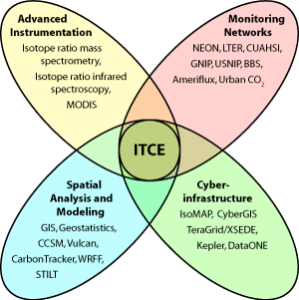Isotopes in Spatial Ecology and Biogeochemistry (SPATIAL Short Course)

Stable isotopes have become an indispensable tool for understanding natural and anthropogenically-influenced systems. Large databases of spatially explicit isotopic data and new data analysis tools are now presenting new opportunities to exploit spatiotemporal isotopic variability (isoscapes) as a source of information on the connectivity, variability, and sensitivity to change of climatalogical, hydrological, and biogeochemical processes. The SPATIAL (Spatio-temporal Isotope Analytics Lab) Short Course builds on the skills and knowledge base developed in IsoCamp (ITCS Course 1) or equivalent stable isotope biogeochemistry coursework to introduce current research themes in large-scale ecology and environmental Earth science, theoretical and technical aspects of assembling and working with large, spatially distributed datasets, and analytical and computational tools available to support such work.
This course focuses on stable isotopes in a geospatial framework to address:
Earth surface systems – Environmental, biological, and anthropogenic controls on ecological and biogeochemical structure
Fluid systems – Source, transport, and reactive process controls on the distribution of isotopic and other biogeochemical tracers
Animal systems (including humans) – Inference of behavior, physiology and movement from spatial data; animal influences on biogeochemical systems Details
- June every year
- Venue: Frederick Albert Sutton Building, University of Utah
- Enrollment limit: 25 (lecture + lab), 10 (lecture only)
- Graduate level credit hours: 6 (lecture + lab), 3 (lecture only)
- Fees: $2,300 (lecture + lab), $1,150 (lecture only)
- Includes all course materials, TRAX pass, lab resources, and several evening meals when evening lectures occur.
- Financial support available to a limited number of graduate students. If interested, please apply for participant support when submitting your course application.
- Lodging: Lodging rates are negotiated each year, and range from about $60-$140 per day, depending on room type and occupancy.
- Meals: Dinners are provided when evening lectures are scheduled (5-6 meals), and hot breakfast is included in the hotel lodging. Attendees are responsible for all other meals during the course. (For your convenience, hotel rooms have fully equipped kitchens for the preparation and storage of food.) There are other dining options on or near campus.
For more information regarding the SPATIAL summer short course, please visit: https://itce.utah.edu/spatial.html
For more information regarding the IsoCamp summer short course, please visit:http://stableisotopes.utah.edu/index.html